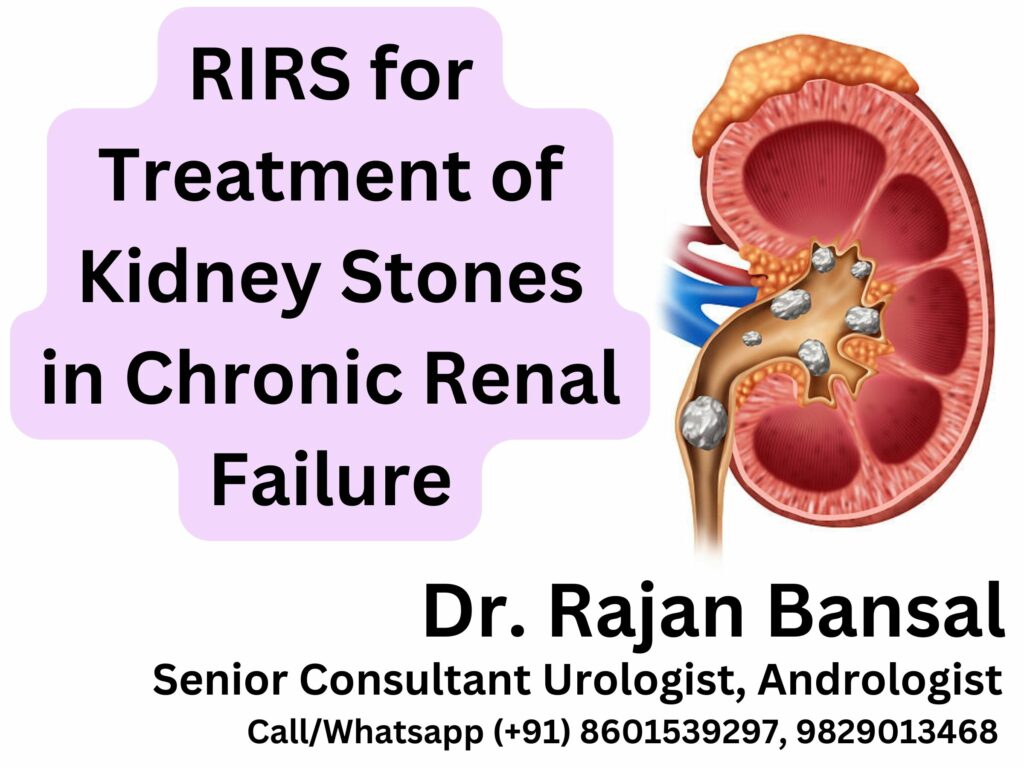Revolutionizing Treatment: Why RIRS is the Preferred Choice in Chronic Renal Failure
RIRS for Treatment of Kidney Stones in Chronic Renal Failure: Chronic Renal Failure (CRF) brings about unique challenges in the field of urology, especially when it comes to managing kidney stones. In recent years, a groundbreaking technique known as Retrograde Intrarenal Surgery (RIRS) has emerged as the preferred choice in CRF cases. This comprehensive guide delves into the reasons behind the preference for RIRS in patients with Chronic Renal Failure, exploring its advantages, considerations, and potential benefits.

Understanding Chronic Renal Failure
Chronic Renal Failure, also known as Chronic Kidney Disease (CKD), is a progressive condition marked by a gradual loss of kidney function over time. It necessitates specialized care and tailored treatment approaches.
The Emergence of RIRS: A Paradigm Shift
Retrograde Intrarenal Surgery (RIRS) has revolutionized the treatment landscape for kidney stones, particularly in cases involving Chronic Renal Failure. This section elucidates the compelling reasons behind the increasing preference for RIRS in managing CRF.
1. Minimally Invasive Precision
The Gentle Approach
Unlike conventional open surgeries, RIRS is minimally invasive, involving access to the kidney through the natural urinary tract. This leads to reduced trauma, minimal blood loss, and a quicker recovery period for patients with compromised kidney function.
2. Nephron Preservation
Protecting Vital Nephrons
Preserving nephrons, the functional units of the kidney, is of paramount importance in CRF cases. RIRS is known for its precision in targeting and removing stones while minimizing damage to healthy kidney tissue. This preservation is crucial for maintaining kidney function in patients with Chronic Renal Failure.
3. Reduced Risk of Contrast-Induced Nephropathy (CIN)
Safeguarding Kidney Function
CRF patients are inherently more susceptible to Contrast-Induced Nephropathy, a condition where kidney function declines after the use of contrast agents. RIRS, compared to other interventions, allows for better control and reduction of contrast exposure, thereby mitigating the risk of CIN.
4. Enhanced Safety Profile
Lowering Complication Rates
RIRS, owing to its minimally invasive nature, boasts a lower risk of postoperative complications, making it an attractive choice for patients with Chronic Renal Failure. The reduced likelihood of infections and other surgical complications is crucial in cases where kidney function is already compromised.
5. Comprehensive Stone Management
Tackling Complex Cases
RIRS has proven to be highly effective in managing complex and large kidney stones, a frequent challenge in CRF patients. Its ability to address a wide range of stone sizes and compositions makes it a versatile and preferred choice in these cases.
6. Tailored Patient Care
Multidisciplinary Collaboration
The success of RIRS in CRF cases often involves a collaborative effort between urologists, sonologists, and anesthesiologists. This ensures a comprehensive assessment, meticulous surgical planning, and tailored perioperative care for each patient.
Best Hospital for Kidney Stone Treatment – Institute of Urology, C Scheme, Jaipur, Rajasthan
In the realm of urology, the preference for Retrograde Intrarenal Surgery (RIRS) in Chronic Renal Failure cases is rooted in its minimally invasive approach, nephron-preserving precision, and reduced risks associated with the procedure. As the field continues to advance, RIRS stands as a beacon of hope for patients facing the intricate challenge of managing kidney stones in the context of compromised kidney function.
At Institute of Urology, Jaipur, out motto is to use the least invasive techniques. Therefore we always carefully examine the patients and analyse everything before making a decision which is best suitable for the fast and long recovery of the patient.
We are proud to say that we have some of the most advanced and modern equipments from around the world and therefore we are able to provide the best possible surgical outcomes to the best of our abilities.
At the end, I want to stress on the fact that whenever you are suffering from stone disease of the kidney, it is utmost important to meet the urologist and then make an informed decision about the procedure you would want to go for. For any further help or assistance, you can contact our doctors on the following numbers directly
Dr. M. Roychowdhury – 9929513468
Dr. Rajan Bansal – 8601539297







